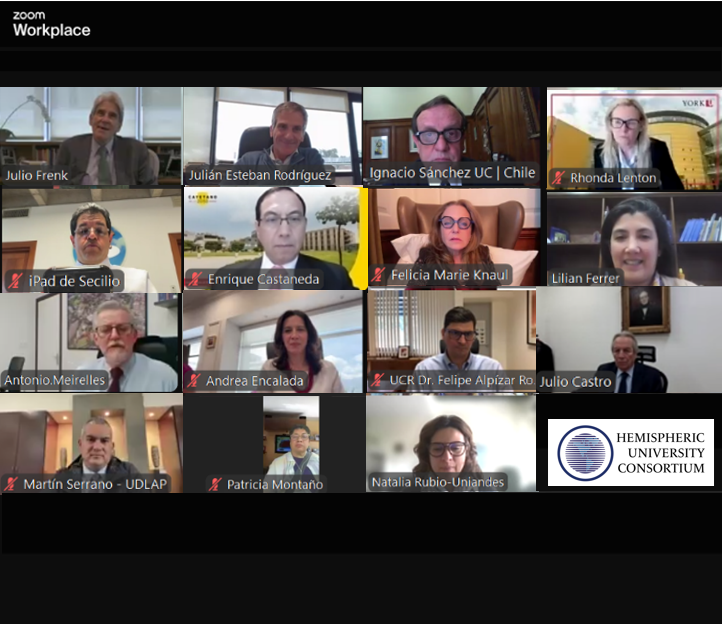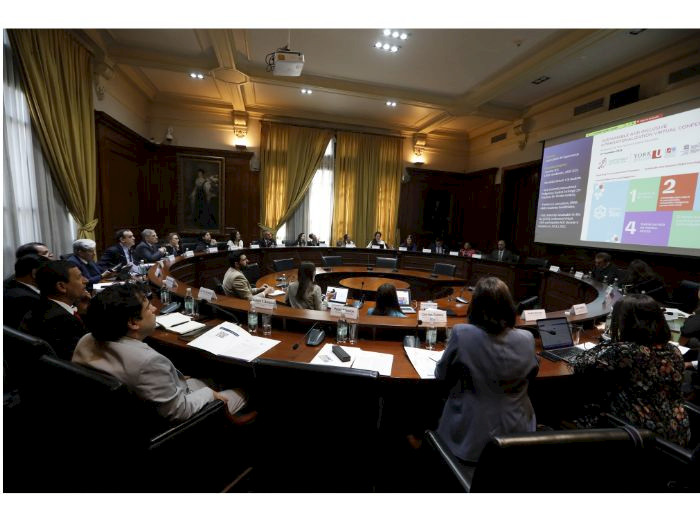The alliance that brings together 14 higher education institutions, Pontificia Universidad Católica de Chile is one of them, addressed the achievements of the different work teams during the meeting, where the collaborative research work stood out, as well as the development of a strategic framework for the consortium.
A general assembly, via teleconference, was held this Tuesday by the rectors of the Hemispheric University Consortium (HUC), an initiative made up of 14 prestigious universities in the Americas, including the Pontificia Universidad Católica de Chile (UC Chile). The main objective of this meeting was to evaluate the progress made by the different work teams of this alliance formed in 2018, which brings together universities from Canada, the United States, Mexico, the Caribbean, Costa Rica, the Dominican Republic, Colombia, and Ecuador, Peru, Brazil, Argentina, and Chile.
“In this general assembly of the Hemispheric University Consortium (HUC), we have confirmed the significant progress of the different work teams. In addition, we have the outstanding presentation of the group of research leaders, which we consider fundamental for the projection of this alliance made up of 14 universities in the Americas,” said the president of HUC and also rector of UC Chile, Ignacio Sánchez.
The university authority added that “this instance has also been key to sharing good practices in teaching and library management, as well as to explore and share platforms that allow us to be integrated in the generation of opportunities. Collaboration in research between academics and students, facing challenges such as climate change, sustainability, inequality, education and health, among others, can mark a very promising path for this consortium.”
The vice president of HUC and rector of the Universidad Austral Argentina, Julián Rodríguez, stressed that “regarding the coming months, we hope to be able to advance in the definition of the strategic plan that will give us a direction for the coming years. The HUC has demonstrated a great capacity to generate joint actions among the universities in the network. Now we must work on the details of the strategic plan to give the best orientation to the actions that are being carried out, which will allow us to consolidate the HUC as a group of universities that aspire to teaching and research of the highest possible quality.”
Similarly, along with the other rectors present at the event, he congratulated the president of the University of Miami, Julio Frenk, who previously led the Hemispheric University Consortium, for his recent appointment as chancellor of UCLA, the main public university in USA.
Strengthening research
The analysis made by the “Research Leaders Group” on the projection of collaborative work was addressed during the meeting. The creation of this group responds to one of the agreements reached at the last meeting of rectors held in Santiago, Chile last year. The vice chancellor of Research at UC Chile, Pedro Bouchon, made a presentation in which he explained the purposes of this instance: to strengthen and promote research with a focus on topics such as public health, well-being, human prosperity, change climate, sustainability and resilience, as well as technology and innovation in higher education.
Bouchon shared the progress of HUC’s virtual research internship program, which allows students from universities in the consortium to collaborate with study projects led by academics from other institutions in this same alliance. The initiative has had sustained growth over time. In 2021, there were 36 students who were able to do their internship and 21 academics involved, in 2023 the number rose to 52 students and 32 professors. This year the program received more than 250 applications from undergraduate students.
“The conclusion is that it is a very valuable project. We want to continue reinforcing it with the possibility that students can accompany their internship with some face-to-face experience at the universities, but also by generating a seed fund that contributes to the program,” stated the vice-rector for Research. The idea would be that these resources could support academic mobility, especially targeting young researchers and undergraduate students.
Another of the topics reviewed during the meeting was Global Learning Experiences and Engagement (HUC GLEE). The presentation was given by Helen Balderama, director of Global Engagement Programs & Partnerships at York University in Canada, and Maribel Flórez, director of Global Training at UC Chile. Balderama reported on the significant participation that this line of work has had: “This program has had impressive growth. To date we have achieved the participation of nearly 8 thousand students.”
“Mutual and collaborative learning is fundamental for this work group. We want to continue working on collaborative online learning and, on the other hand, generate indicators that also allow us to evaluate the performance and quality of the initiatives,” stated Maribel Flórez.
In the case of the group that includes the “Library Network” of the consortium, Evelyn Didier, who is director of Libraries at UC Chile, presented. “One of our main objectives is to strengthen the impact on the fulfillment of the Sustainable Development Goals (SDGs) that guide HUC, through facilitating the exchange of information, resources, experience and the use of digital tools, publications and articles, generating a collaborative space for education, research and innovation,” Didier explained. The group has been characterized by developing a significant number of seminars and webinars in which good practices are presented, as well as working on developing a web platform that allows the libraries of the universities that make up HUC to share various resources.
The progress of the “Platform for innovation and research” group was presented by Camilo Villa, head of Cooperation and Research Networks at the Universidad de los Andes in Colombia. This is how he realized the virtual internship program. “To date we have managed to complete a number of 126 virtual research internships. Although it started with undergraduate students, it has been extended to master’s and doctoral students,” he commented. Likewise, he emphasized that starting this year, collaboration between academics participating in research projects is deepening, and that this initiative has been highlighted internationally by organizations such as UNESCO IESALC, which have classified it as an innovative format for virtual mobility.
Next steps
The next general assembly will be held at the Universidad San Francisco de Quito (USFQ) in Ecuador, in October of this year. Andrea Encalada, vice-rector of USFQ stated that “we have made a lot of progress, there are many expectations of what the meeting in Quito will be like, so the different projects will be presented. It is a consortium that can empower all universities and as USFQ we are honored to belong to HUC, contributing strongly to its development.”
The vice-rector of International Affairs of UC Chile, Lilian Ferrer, valued the meeting held and also highlighted the potential that the consortium has at the international level. “A solid network in the American hemisphere has the power to drive the comprehensive growth of our region. HUC offers us that opportunity,” she stated.
The higher education institutions that conform the Hemispheric University Consortium are: Universidad Austral (Argentina), Universidad Estadual de Campinas (Brazil), York University (Canada), The University of the West Indies (Caribbean), Universidad Andrés Bello (Chile), Pontificia Universidad Católica de Chile (Chile), Universidad de los Andes (Colombia), Universidad de Costa Rica (Costa Rica), Pontificia Universidad Católica Madre y Maestra (Dominican Republic), Universidad San Francisco de Quito (Ecuador), Tecnológico de Monterrey (Mexico), Universidad de las Américas Puebla (Mexico), Universidad Peruana Cayetano Heredia (Peru), and University of Miami (United States).

Picture of participants present at HUC general assembly held online on Tuesday, June 18, 2024

